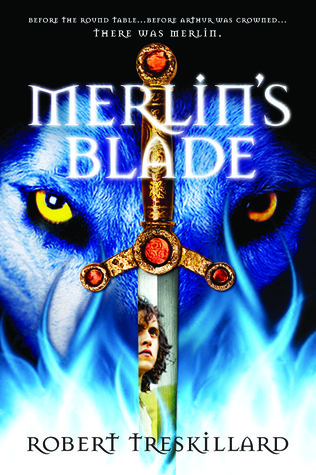
The theme of this story seems obvious from its title—Merlin, yes, so obviously it’s a story about Arthur. Arthur and Merlin maybe, but most certainly Arthur.
Merlin’s Blade, however, is touted as the story before Arthur—the story of Merlin.
In this, the first book of The Merlin Spiral, Robert Treskillard writes the story of a blacksmith’s son, half-blind, only able to see blurs and shadows, but able to see some things better than most of the stronger, more clear-sighted villagers around him. In keeping with this, the book follows Merlin’s attempts to find his way in the world and his struggle to fit into a broken family.
At the same time, Merlin’s Blade is also the story of the young Merlin’s first encounter with supernatural power, when the old forces of Druidic magic and idolatry invade his quiet home village in Cornwall. And Cornwall, or ‘Kernow’ as Treskillard calls it, is an easy prey as the villagers split between the new way of peace and the old way of fear, superstition, and greed.
As darkness spreads around the village, the High King, Uther Pendragon arrives with his family, ready to raise the country against the Saxon threat on the kingdom’s borders. And, from there, the story spirals into chaos.
Treskillard uses parts of the legend as his base, while tweaking other parts slightly, perhaps because of the book's YA audience. Merlin’s Blade hints that Uther has a long-standing rivalry with Gorlas, King of Cornwall, related to Uther’s marriage to Queen Igerna, but it skips neatly over the usual version of the tale. This appears to be the biggest change to the legend, though I also picked up some guesses about the Lady of the Lake and the blade of the title—a sword which Merlin helps his father to forge through the course of the story.
Still, as other reviewers have noted, Merlin’s Blade is something more than a rewrite of Arthurian legend. Uther, and his infant son Arthur show up, yes, but this story ends goes back before the beginnings. In fact, apart from Uther, and his son Arthur, I found more references to standard Arthurian fare in the appendix than I did anywhere else in the book. At its core, the book is the story of Merlin’s coming of age and how he came to swear allegiance to Uther Pendragon.
For myself, I enjoyed the read. I found only a couple points of difficult, mainly due to the wide cast of characters—and some strange sounding names at that—which make the story hard to follow at a couple points. There is also some rather natural dithering among some characters, and at one point, Merlin manages to convince his father—with no questions asked—of something he knows only by special knowledge, but these were relatively minor points compared to Treskillard's work as a whole. After finishing Merlin's Blade, I definitely am curious to see how the story continues through the next two books of the trilogy. Treskillard leaves hints of more Arthurian fare to come, but I hope the trilogy will keep on as it has started.

